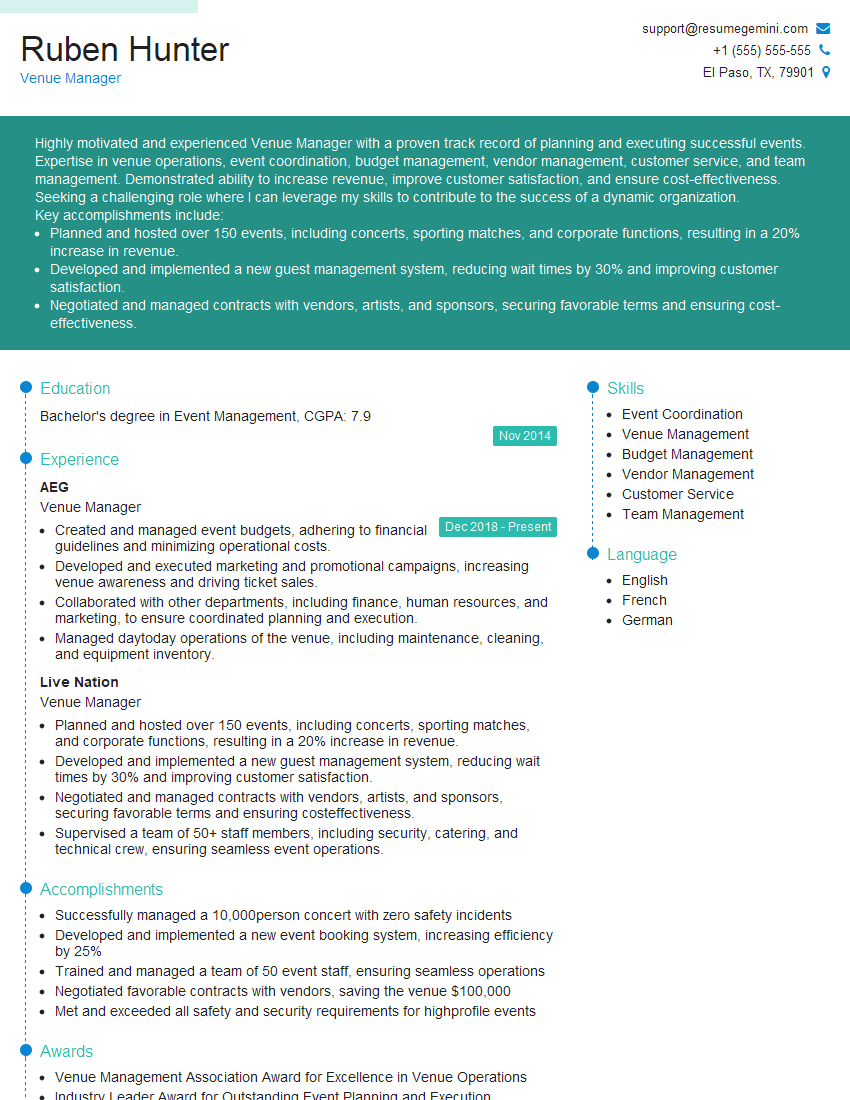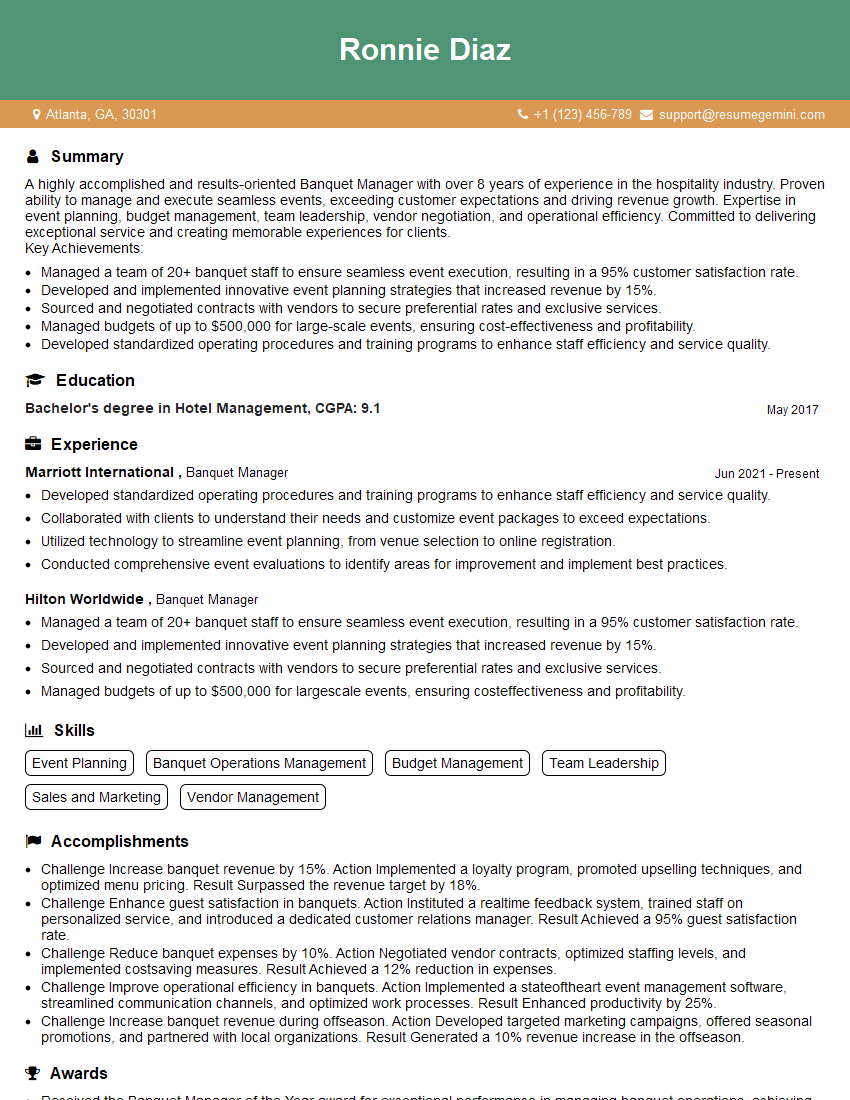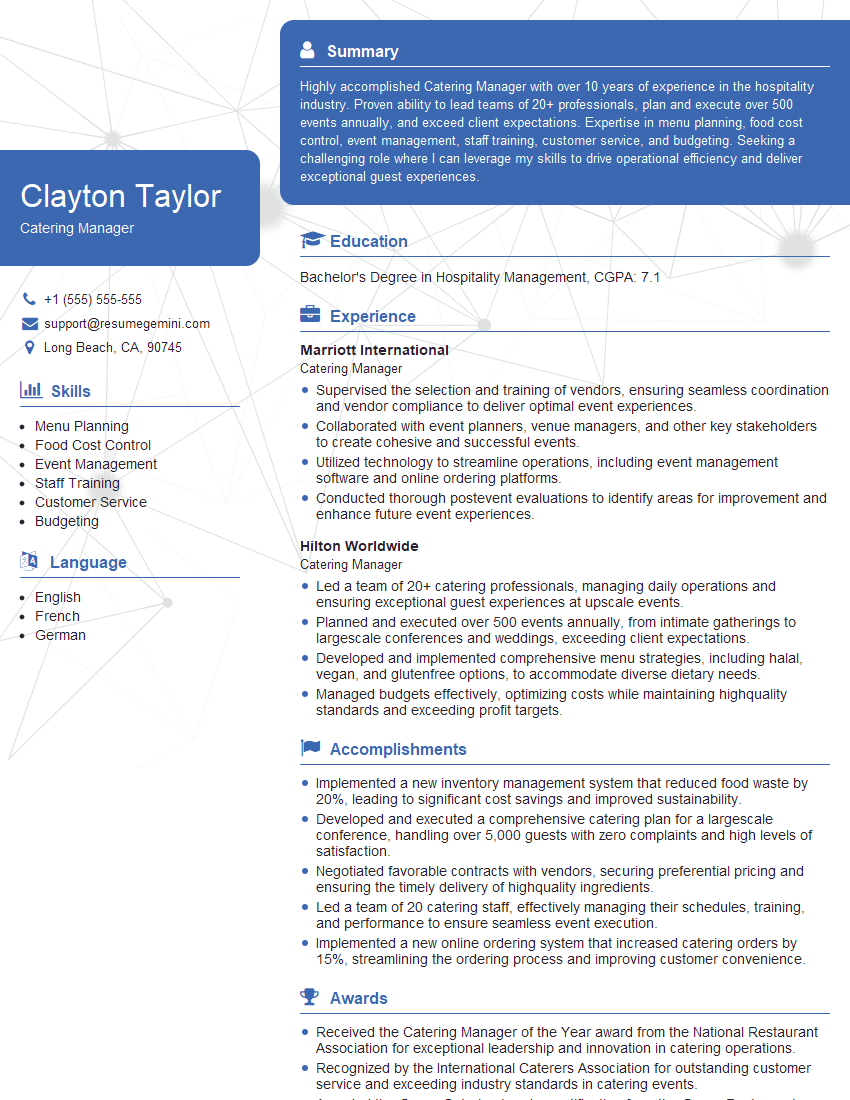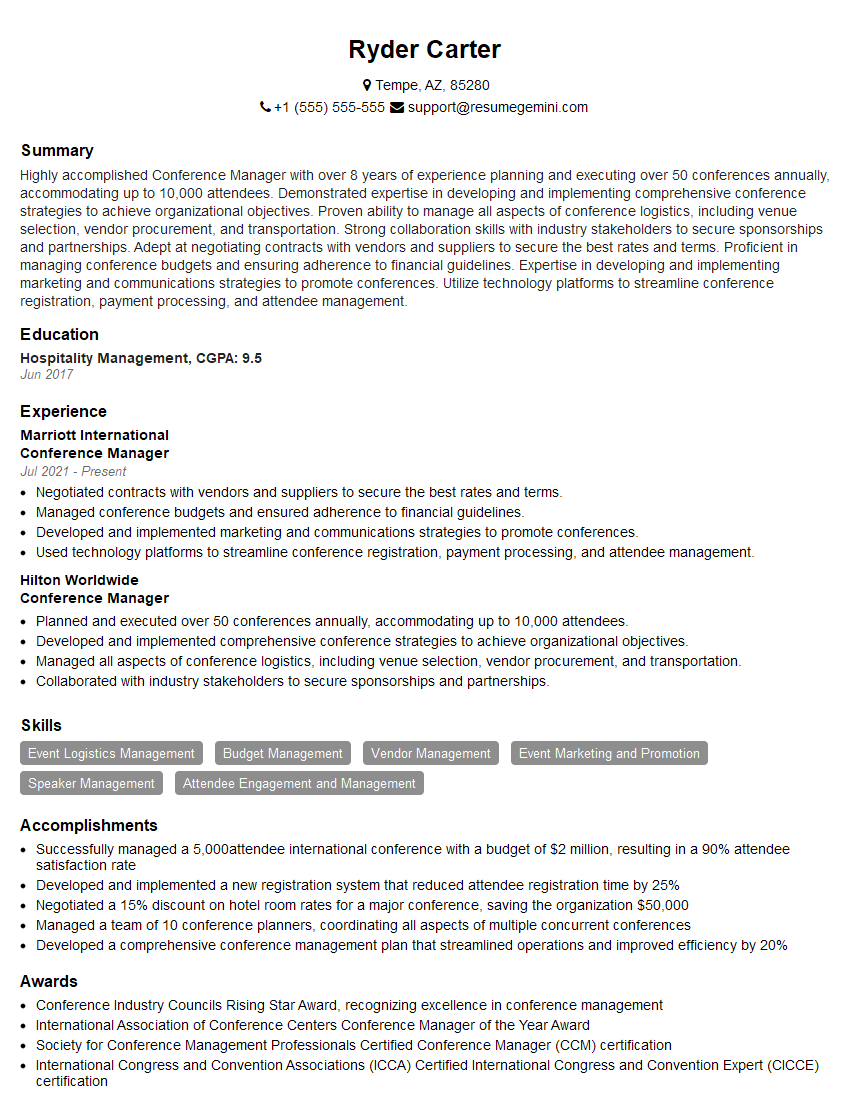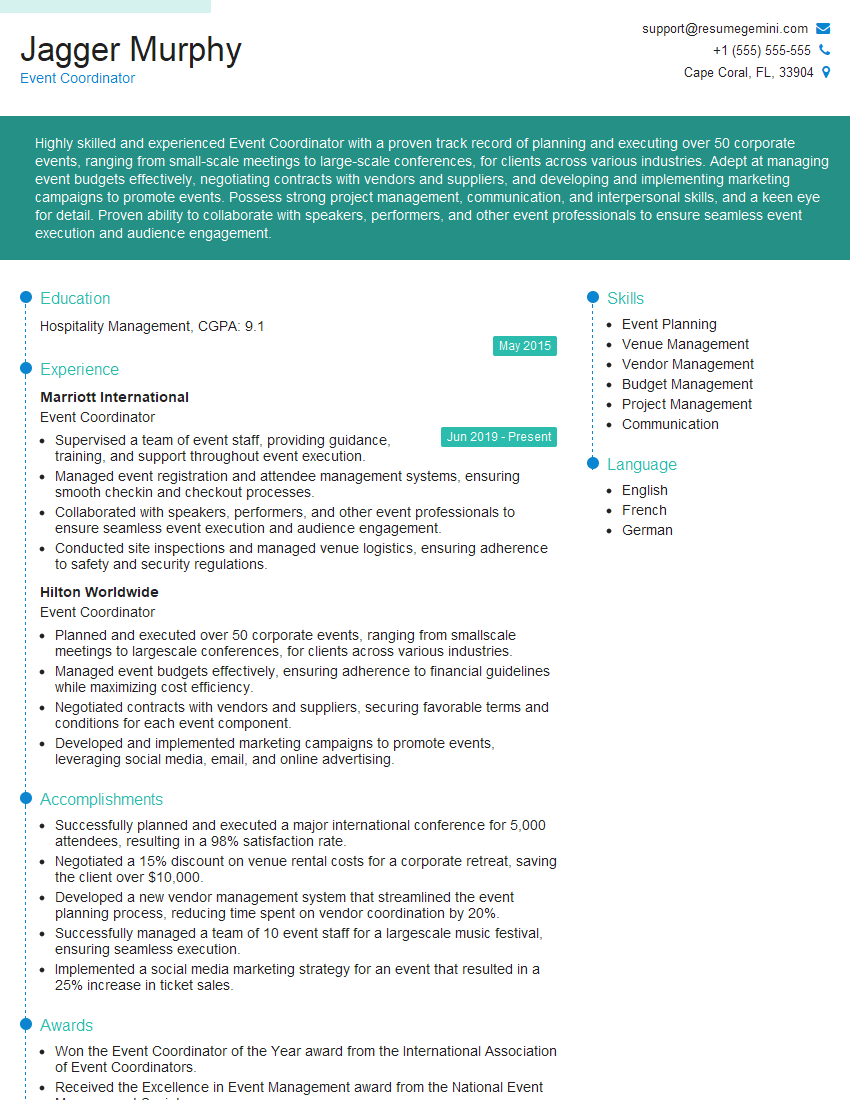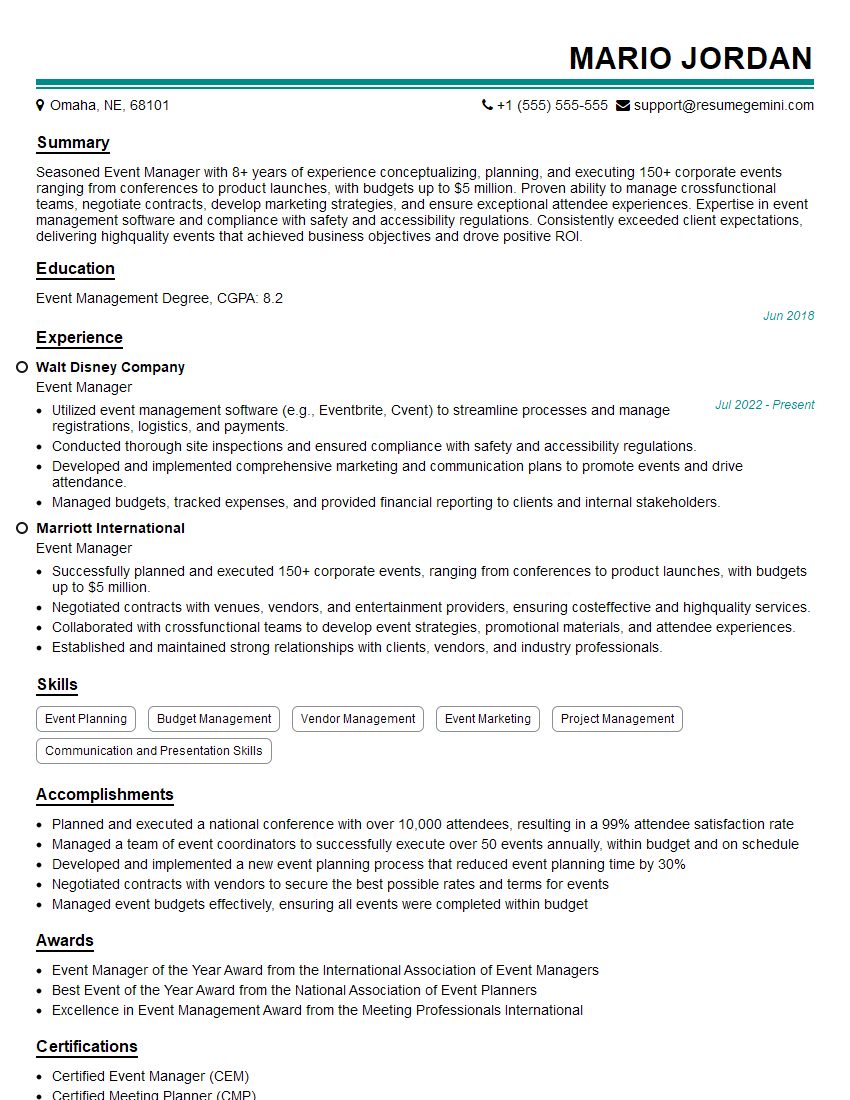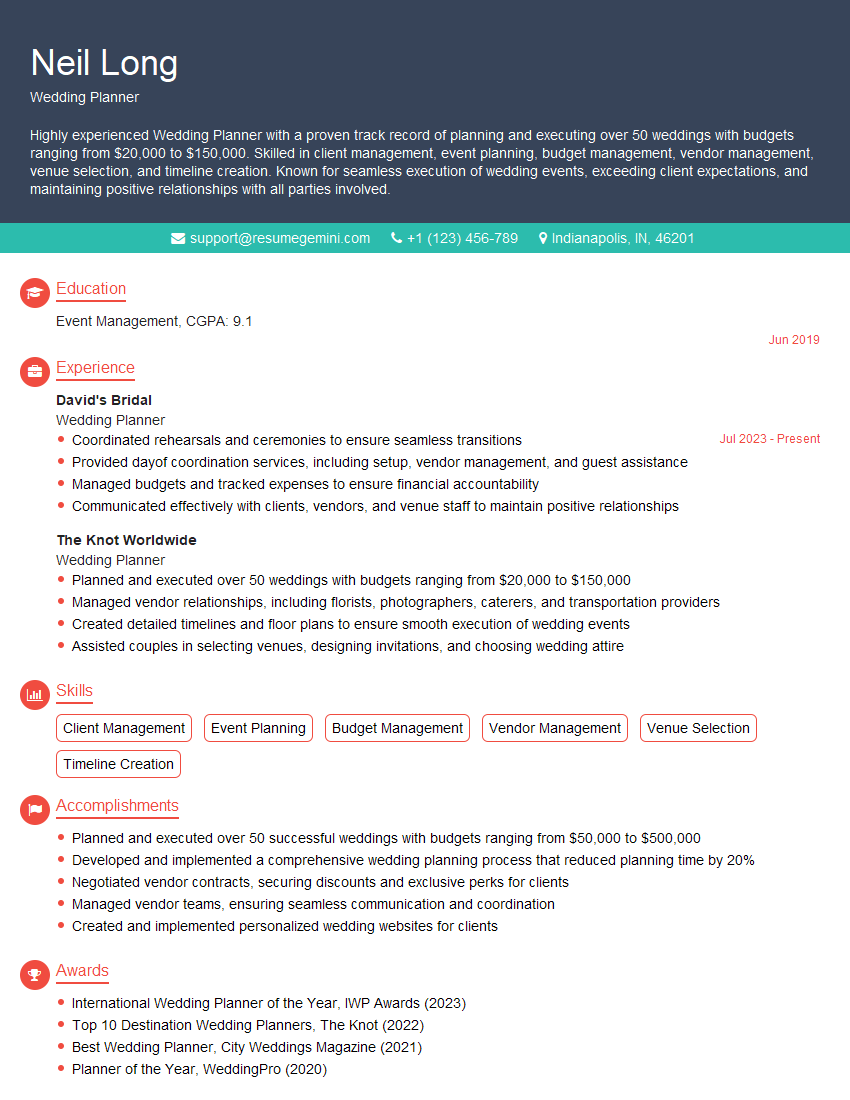Preparation is the key to success in any interview. In this post, we’ll explore crucial Event and Venue Management interview questions and equip you with strategies to craft impactful answers. Whether you’re a beginner or a pro, these tips will elevate your preparation.
Questions Asked in Event and Venue Management Interview
Q 1. Describe your experience managing event budgets.
Managing event budgets requires a meticulous approach, starting with a detailed breakdown of projected costs. I begin by creating a comprehensive budget spreadsheet outlining all anticipated expenses – venue rental, catering, marketing, entertainment, staffing, technology, permits, insurance, and contingency funds. Each category is further itemized to allow for precise tracking. For instance, under ‘catering,’ I would list costs per head, beverage packages, and any special dietary requirements.
Throughout the planning process, I regularly review and update the budget, comparing actual spending against projections. This allows for proactive adjustments and prevents overspending. For example, if initial marketing efforts yield unexpectedly high registration numbers, I might reallocate funds from contingency to enhance the event experience, perhaps by upgrading the catering or adding interactive elements. Conversely, if registration is lower than projected, I might negotiate lower prices with vendors or cut back on less crucial aspects.
I also leverage budgeting software to streamline the process, track expenses, and generate reports. This ensures transparency and provides a clear overview of the financial health of the event. Finally, I present regular budget updates to stakeholders, ensuring everyone is informed and aligned on financial progress.
Q 2. How do you handle unexpected challenges during an event?
Unexpected challenges are inevitable in event management. My approach focuses on preparedness and quick, decisive action. I always maintain a comprehensive contingency plan, anticipating potential issues like equipment malfunctions, speaker cancellations, or unforeseen weather events. This plan details alternative solutions for each scenario. For example, for a keynote speaker cancellation, I might have a backup speaker ready or arrange a compelling alternative program.
When an unexpected issue arises, my first step is to assess the situation calmly, gather information from my team, and identify the impact on the event. Then, I prioritize solutions, focusing on the most critical aspects first. Effective communication is vital; I keep stakeholders, attendees, and the team informed about the situation and the steps being taken. Transparency builds trust and reduces anxiety.
For instance, during an outdoor concert, a sudden downpour threatened to disrupt the event. Following our contingency plan, we quickly mobilized the team to redirect attendees to covered areas, secure equipment, and inform sponsors. While the event was slightly delayed, we avoided significant disruption or damage, thanks to proactive planning and swift response.
Q 3. What software or tools do you use for event planning?
Technology plays a crucial role in modern event planning. I utilize a range of software and tools to streamline various aspects of event management. My go-to tools include project management software like Asana or Trello to organize tasks, deadlines, and team communication. For budget management, I rely on spreadsheets and specialized budgeting software.
Event registration and ticketing is handled through platforms like Eventbrite or Ticketmaster, depending on the event scale. These tools automate registration, manage attendee data, and provide valuable analytics. For communication, I leverage email marketing platforms, social media management tools, and communication apps like Slack for team coordination. Finally, I use CRM (Customer Relationship Management) systems to track interactions with attendees, sponsors, and vendors, ensuring consistent and personalized communication throughout the event lifecycle.
Q 4. Explain your process for selecting vendors and negotiating contracts.
Vendor selection is a critical process requiring thorough research and evaluation. I begin by defining clear requirements, outlining the services needed and setting quality standards. This is followed by identifying potential vendors through online research, industry directories, and recommendations.
I then assess potential vendors based on factors such as experience, reputation, references, and pricing. I typically request proposals, compare offerings, and conduct interviews to ensure a good fit. Negotiating contracts involves a collaborative approach, focusing on achieving a mutually beneficial agreement. This includes clarifying service details, payment terms, liability clauses, and cancellation policies. I ensure all agreements are documented clearly in legally sound contracts, protecting both parties’ interests. A crucial aspect is building strong relationships with vendors, fostering open communication and collaboration throughout the event process.
Q 5. How do you manage event risk and develop contingency plans?
Risk management is an integral part of event planning, mitigating potential problems before they arise. I employ a systematic approach, starting with risk identification, assessing the likelihood and potential impact of each risk. This includes considering factors like weather, security, health concerns, and logistical challenges. For example, a large outdoor event might be at risk of inclement weather, requiring a backup plan in case of rain.
Once risks are identified, I develop tailored mitigation strategies. This might include purchasing insurance, securing appropriate permits, developing contingency plans for different scenarios (e.g., emergency evacuation procedures, backup power generators), and creating a detailed crisis management plan outlining communication protocols and responsibilities. Regularly reviewing and updating the risk assessment and mitigation strategies throughout the event planning process ensures preparedness for unforeseen events.
Q 6. Describe your experience with event registration and ticketing systems.
My experience with event registration and ticketing systems spans various platforms, adapting to the specific needs of each event. For smaller events, I might utilize simple online forms or spreadsheets for registration. However, for larger events, I rely on professional ticketing platforms like Eventbrite or Ticketmaster. These platforms offer robust features like automated registration, payment processing, attendee management, and reporting functionalities.
I ensure seamless integration with other systems, such as CRM, for data consistency and efficient communication. Furthermore, I pay close attention to user experience, optimizing the registration process to minimize friction and ensure ease of use for attendees. Clear instructions, FAQs, and responsive customer support are crucial for a positive registration experience. Post-event, I analyze registration data to understand attendee demographics, engagement levels, and other valuable insights for future events.
Q 7. How do you track event metrics and measure success?
Tracking event metrics and measuring success involves a multi-faceted approach, going beyond simply counting attendees. I define Key Performance Indicators (KPIs) before the event, focusing on aspects relevant to the event’s objectives. These KPIs might include registration numbers, attendee engagement (e.g., social media mentions, survey responses), sponsor satisfaction, revenue generated, and overall customer satisfaction (measured through post-event surveys).
I leverage event management software and analytics tools to gather data and track progress throughout the event lifecycle. Post-event, I compile data, analyze trends, and generate reports summarizing the event’s performance against the predefined KPIs. This analysis informs future event planning, highlighting areas of success and identifying opportunities for improvement. For instance, low attendee engagement at a specific session might suggest revisiting the session’s content or format for future events.
Q 8. How do you ensure event sustainability and reduce environmental impact?
Event sustainability is paramount in today’s world. It’s about minimizing the environmental footprint of an event throughout its lifecycle, from planning to post-event cleanup. My approach is multifaceted and integrates sustainable practices throughout the entire process.
- Sustainable Sourcing: I prioritize vendors who use recycled or sustainably sourced materials for everything from catering to decorations. For example, I’d opt for locally sourced food to reduce transportation emissions and support local businesses, and I’d choose biodegradable tableware instead of plastic.
- Waste Reduction and Management: Implementing a comprehensive waste management plan is crucial. This includes providing clear signage for recycling and composting, partnering with waste management companies specializing in event waste diversion, and encouraging attendees to bring reusable water bottles.
- Energy Efficiency: I strive to reduce energy consumption by using energy-efficient lighting and equipment, optimizing venue energy use, and exploring renewable energy options where feasible. For instance, I might negotiate with the venue to use LED lighting instead of traditional bulbs.
- Carbon Offsetting: For unavoidable emissions, I explore carbon offsetting programs to neutralize the event’s carbon footprint. This could involve supporting reforestation projects or investing in renewable energy initiatives.
- Transportation: I encourage attendees to use public transportation, cycling, or carpooling whenever possible by highlighting these options in promotional materials and providing clear directions.
By systematically implementing these strategies, we can significantly reduce an event’s environmental impact and contribute to a more sustainable events industry.
Q 9. How familiar are you with different venue types and their capacities?
My experience encompasses a wide range of venue types, each with its own unique characteristics and capacity limitations. I’m familiar with:
- Hotels and Conference Centers: Offering various sizes of ballrooms, meeting rooms, and breakout spaces, ideal for corporate events, conferences, and weddings. Capacities range from intimate gatherings to large-scale conferences with thousands of attendees.
- Convention Centers: Large-scale facilities designed to accommodate massive events, trade shows, and exhibitions, often with a capacity of several thousand people.
- Outdoor Venues: Parks, gardens, farms, beaches, and stadiums, offering unique settings for events like festivals, concerts, and weddings. Capacities vary significantly depending on the space and event layout.
- Unique Venues: Museums, art galleries, historical buildings, and other unique spaces provide memorable backdrops but often have limited capacities and require careful logistical planning.
- Restaurants and Banquet Halls: Smaller, more intimate venues ideal for smaller-scale events, such as corporate dinners or private parties, usually with a capacity under a few hundred.
Knowing the specific capabilities of each venue type allows me to efficiently match the venue to the client’s needs and expectations. I also consider factors like accessibility, parking, technical capabilities, and catering options when evaluating venue suitability.
Q 10. Describe your experience with site inspections and venue selection.
Site inspections are an essential part of the venue selection process. My approach involves a thorough and systematic evaluation of the potential venue to ensure it meets the client’s needs and event requirements.
- Pre-Inspection Research: Before the site visit, I thoroughly review venue brochures, online reviews, and floor plans to gain a preliminary understanding of the space.
- On-Site Assessment: During the inspection, I meticulously assess the venue’s layout, capacity, accessibility, technical capabilities (audio-visual equipment, Wi-Fi), catering facilities, parking, and overall ambiance. I also take photographs and make detailed notes.
- Meeting with Venue Staff: I interact with the venue’s staff to discuss logistical aspects, pricing, contracts, and any potential challenges or limitations.
- Risk Assessment: I identify potential risks and challenges associated with using the venue and develop mitigation strategies. For example, I would consider backup plans in case of inclement weather for an outdoor event.
- Client Input: Throughout the process, I keep the client informed and incorporate their feedback and preferences in the venue selection.
For example, during a recent site inspection for a corporate conference, I discovered that the Wi-Fi infrastructure in one venue was inadequate for the number of attendees. This led to choosing an alternative venue with better technological capabilities to avoid potential disruptions.
Q 11. How do you manage communication with clients, vendors, and staff?
Effective communication is the cornerstone of successful event management. I use a multi-faceted approach to ensure clear and consistent communication with clients, vendors, and staff.
- Project Management Software: I leverage project management tools such as Asana or Trello to centralize communication, track tasks, manage deadlines, and share important documents. This ensures everyone is on the same page and avoids miscommunications.
- Regular Meetings: I conduct regular meetings with clients, vendors, and staff to discuss progress, address concerns, and make necessary adjustments. The frequency of these meetings depends on the project phase and its complexity.
- Email and Instant Messaging: I use email and instant messaging for quick updates and follow-ups. However, I prefer more formal methods for critical information to maintain a clear record.
- Clear Communication Protocols: I establish clear communication protocols from the beginning to define who is responsible for what and how communication will flow. For example, I define designated contact persons for each stakeholder group.
- Detailed Documentation: I maintain detailed records of all communications, decisions, and agreements to ensure transparency and accountability.
This system ensures everyone is informed, aligned, and contributes effectively to the event’s success.
Q 12. Explain your approach to post-event analysis and reporting.
Post-event analysis and reporting are crucial for continuous improvement and future event planning. My approach involves a structured process to evaluate the event’s success and identify areas for enhancement.
- Data Collection: I gather data from various sources, including attendee feedback surveys, financial reports, vendor performance evaluations, and event-day observations.
- Key Performance Indicators (KPIs): I define key performance indicators (KPIs) relevant to the event’s objectives, such as attendee satisfaction, budget adherence, and return on investment (ROI).
- Qualitative and Quantitative Analysis: I conduct both qualitative (e.g., analyzing attendee feedback) and quantitative (e.g., analyzing attendance figures and financial data) analysis to gain a comprehensive understanding of the event’s performance.
- Report Generation: I prepare a detailed report that summarizes the event’s performance against KPIs, highlighting successes and areas for improvement. This report includes recommendations for future events.
- Dissemination of Findings: The report is shared with relevant stakeholders including the client, the event team, and relevant vendors for constructive feedback and action planning.
This systematic analysis ensures that lessons learned are applied to future events, leading to greater efficiency, improved outcomes, and enhanced client satisfaction.
Q 13. How do you handle difficult client requests or complaints?
Handling difficult client requests or complaints requires a calm, professional, and empathetic approach. My strategy focuses on active listening, clear communication, and finding mutually acceptable solutions.
- Active Listening: I actively listen to the client’s concerns without interruption to fully understand their perspective and the root cause of their dissatisfaction.
- Empathy and Validation: I acknowledge and validate the client’s feelings, showing empathy and understanding even if I don’t agree with their perspective.
- Problem-Solving: I collaboratively work with the client to identify solutions that address their concerns and meet the event objectives. This may involve offering alternative options or making necessary adjustments to the event plan.
- Transparency and Honesty: I am transparent and honest with the client, explaining any constraints or limitations and keeping them informed throughout the process.
- Documentation: I document all communication and agreements related to the complaint to ensure accountability and avoid future misunderstandings.
For example, I once had a client who unexpectedly requested a major change to the event’s venue only a few weeks before the event date. By calmly explaining the logistical challenges and exploring alternative options, we found a suitable compromise that minimized disruption and kept the client satisfied.
Q 14. Describe your experience with event marketing and promotion.
Event marketing and promotion are critical for attracting attendees and achieving event goals. My approach is strategic and multi-channel, utilizing a blend of traditional and digital marketing techniques.
- Target Audience Definition: I start by defining the target audience for the event to tailor marketing messages and channels effectively.
- Marketing Plan Development: I develop a comprehensive marketing plan outlining the marketing goals, target audience, budget, timeline, and specific marketing channels to be used.
- Digital Marketing: I utilize digital marketing channels, such as social media marketing (creating engaging content and running targeted ads), email marketing (building an email list and sending targeted email campaigns), and search engine optimization (SEO) to increase online visibility.
- Traditional Marketing: I leverage traditional marketing channels such as print advertising (in relevant publications), public relations (press releases, media outreach), and partnerships (collaborating with complementary organizations).
- Content Marketing: I develop engaging content like blog posts, articles, videos, and infographics to attract and inform potential attendees.
- Tracking and Analysis: I track and analyze marketing performance using relevant metrics (e.g., website traffic, social media engagement, registrations) to optimize campaigns and improve ROI.
For instance, in promoting a recent music festival, we utilized a combination of social media marketing campaigns, influencer partnerships, and targeted radio advertising to reach the desired demographic. This resulted in exceeding attendance goals and a significant increase in media coverage.
Q 15. What is your approach to team building and managing event staff?
Team building and effective staff management are crucial for successful events. My approach is multifaceted, focusing on clear communication, delegation, and fostering a collaborative environment. Before an event, I conduct thorough training sessions, ensuring everyone understands their roles and responsibilities. This includes clear communication protocols, emergency procedures, and client expectations. I utilize a combination of team-building exercises, both formal and informal, to build rapport and trust among team members. For example, pre-event brainstorming sessions and post-event debriefs are valuable for identifying areas of improvement and celebrating successes. I also emphasize open communication channels, encouraging feedback and addressing concerns promptly. Regular check-ins during an event ensure everyone stays on track and any challenges are tackled efficiently. This proactive approach translates to a more coordinated and efficient team, minimizing stress and maximizing productivity.
For larger events, I often utilize a team lead structure, assigning responsibilities and accountability to individuals, facilitating efficient delegation and oversight.
Career Expert Tips:
- Ace those interviews! Prepare effectively by reviewing the Top 50 Most Common Interview Questions on ResumeGemini.
- Navigate your job search with confidence! Explore a wide range of Career Tips on ResumeGemini. Learn about common challenges and recommendations to overcome them.
- Craft the perfect resume! Master the Art of Resume Writing with ResumeGemini’s guide. Showcase your unique qualifications and achievements effectively.
- Don’t miss out on holiday savings! Build your dream resume with ResumeGemini’s ATS optimized templates.
Q 16. How do you ensure compliance with safety and security regulations?
Ensuring compliance with safety and security regulations is paramount. My approach begins with a thorough risk assessment of the venue and planned activities, identifying potential hazards. This involves working closely with venue management and local authorities to understand all relevant regulations, such as fire safety codes, emergency evacuation plans, and crowd control measures. We develop comprehensive safety plans that address each identified risk. This might include implementing security checkpoints, providing adequate lighting and signage, and having trained personnel manage crowd flow. For events serving alcohol, we ensure compliance with liquor licensing laws and implement responsible serving practices. We conduct regular safety inspections, both before and during the event, ensuring all equipment is functioning correctly and safety measures are in place. Finally, detailed documentation of all safety procedures and incident reports is maintained for accountability and continuous improvement.
For example, at a recent outdoor concert, we collaborated with the local fire marshal to map out multiple evacuation routes, ensuring sufficient accessibility and clearly marked exits.
Q 17. How familiar are you with ADA compliance and accessibility requirements?
I am thoroughly familiar with the Americans with Disabilities Act (ADA) compliance and accessibility requirements. Understanding and implementing ADA standards is not just a legal obligation; it’s about creating an inclusive and welcoming environment for all attendees. My approach starts with careful site selection and venue assessment. This involves checking for wheelchair accessibility, ramps, accessible restrooms, and appropriate signage. We also ensure that all printed materials are available in accessible formats, such as Braille or large print. For online registrations, we ensure the website is ADA compliant. During the event planning phase, I work with vendors to ensure accessibility in all areas, including seating arrangements, stage design, and audio-visual presentations. We also consider the needs of attendees with other disabilities, such as those with hearing or visual impairments, providing appropriate accommodations. Detailed planning and communication with attendees regarding accessibility options are critical to successful ADA compliance.
For instance, I once worked on a conference where we provided real-time captioning for all presentations and designated quiet spaces for attendees with sensory sensitivities.
Q 18. What is your experience with event technology and audiovisual systems?
My experience with event technology and audiovisual systems is extensive. I’m proficient in selecting and managing various technologies, from basic sound systems to sophisticated lighting rigs and interactive displays. I collaborate closely with AV technicians to ensure seamless integration of technology with the event’s overall design and flow. This includes detailed planning for audio and video streaming, live broadcasting, and interactive elements. I have experience with various event management software systems for registration, ticketing, and scheduling. Understanding the technical requirements of the event is crucial, ensuring that the chosen technology meets the needs of the presenters, performers, and the audience. I also understand the importance of contingency planning for technical issues; having backup systems and procedures in place is crucial to prevent disruption.
For example, at a recent corporate gala, we used a sophisticated lighting system with dynamic color changes synchronized to the music, enhancing the overall ambiance.
Q 19. Describe your experience with event logistics, including setup and breakdown.
Event logistics, from setup to breakdown, are critical for a smooth event flow. My experience encompasses meticulous planning and coordination across various aspects. This involves developing detailed floor plans, outlining the placement of furniture, equipment, and decorations. I manage vendor relations, scheduling deliveries and coordinating with various teams, ensuring everything arrives on time and in the correct place. I oversee the setup process, including staging, lighting, sound, and catering arrangements. During the event, I monitor the logistics, addressing any unexpected issues promptly. After the event concludes, I coordinate the efficient and safe removal of equipment and materials, ensuring the venue is returned to its original state. Detailed checklists and communication protocols are utilized to maintain accuracy and efficiency throughout the entire process. This requires strong organizational skills and the ability to adapt to unexpected challenges.
For instance, at a large trade show, I managed the complex logistics of booth setup for over 50 exhibitors, ensuring each had the necessary resources and support.
Q 20. How do you manage event timelines and deadlines effectively?
Effective timeline and deadline management is the cornerstone of successful event planning. I use project management methodologies, such as Gantt charts, to visually represent tasks, deadlines, and dependencies. This allows for clear visualization of the entire event timeline and proactive identification of potential conflicts. I create detailed schedules for each team, outlining tasks, responsibilities, and deadlines. Regular progress meetings are held to monitor milestones and address any delays. Risk mitigation strategies are built into the timeline, identifying potential issues and developing contingency plans. Flexibility is crucial; I am adept at adapting the schedule to address unexpected changes or challenges. Clear communication with all stakeholders, including clients, vendors, and staff, is essential to keep everyone informed and on track. Regular reporting and updates ensure transparency and accountability throughout the planning process.
For example, using a Gantt chart helped us successfully coordinate multiple vendors for a complex wedding, ensuring all elements aligned perfectly with the wedding schedule.
Q 21. Explain your experience with event insurance and liability issues.
Event insurance and liability are crucial considerations. I have extensive experience in understanding various types of event insurance policies, including general liability, cancellation insurance, and equipment insurance. I work closely with insurance brokers to secure appropriate coverage for each event, customizing the policy to meet the specific needs and risks involved. This includes identifying potential liability issues, such as injuries or property damage, and ensuring adequate coverage to protect the event organizers and participants. Understanding the terms and conditions of the insurance policy is crucial, and I ensure clear communication with all stakeholders regarding coverage and claims procedures. Proactive risk management, including comprehensive safety plans and adherence to regulations, minimizes the likelihood of incidents that could lead to insurance claims. Maintaining detailed records of all aspects of the event is important for any potential insurance claims.
For example, before a large festival, we ensured we had comprehensive liability insurance to cover potential accidents or damage to property.
Q 22. How do you handle event cancellations or postponements?
Event cancellations and postponements are unfortunately a reality in our industry. My approach is proactive and focuses on minimizing disruption and financial impact. First, I carefully review the contract, identifying cancellation clauses and potential liabilities. This includes understanding the client’s cancellation policy and any force majeure clauses that might apply (unforeseeable circumstances like natural disasters). Then, I immediately communicate with all stakeholders – clients, vendors, and attendees – providing clear, timely information about the change. For postponements, we work collaboratively with the client to identify a suitable alternative date, considering venue availability and vendor schedules. For cancellations, I meticulously manage refunds and work with vendors to negotiate cancellations fees. For example, I once had to reschedule a large conference due to a hurricane. By acting quickly and maintaining open communication, we successfully rescheduled the event with minimal disruption and managed to retain most sponsors and attendees.
- Step 1: Review contracts and identify clauses.
- Step 2: Communicate with all stakeholders.
- Step 3: Manage refunds and negotiate with vendors.
- Step 4: (For postponements) Collaborate on a new date.
Q 23. Describe your experience with event catering and food and beverage management.
Catering and F&B management are crucial for creating a memorable event experience. My experience encompasses all aspects, from menu planning and vendor selection to budget management and on-site supervision. I work closely with catering companies to develop menus tailored to the event’s theme, dietary requirements, and budget. This includes everything from formal seated dinners to casual buffets and cocktail receptions. I’ve managed events with diverse culinary needs, including vegetarian, vegan, gluten-free, and allergen-free options. Before the event, I thoroughly review contracts, ensuring clear specifications about food quality, service standards, and timelines. During the event, I oversee food preparation, service, and waste management to maintain high standards and prevent disruptions. For example, for a recent corporate gala, we collaborated with the caterer to design an interactive food station showcasing local cuisine. This was a huge success, creating a unique and engaging experience for the guests.
- Menu planning: Collaborating with chefs and clients to create diverse menus.
- Vendor selection: Vetting catering companies based on reputation and experience.
- Budget management: Controlling costs while maintaining high quality.
- On-site supervision: Ensuring smooth food service and high quality standards.
Q 24. How do you ensure smooth transitions between event phases?
Smooth transitions are vital for seamless event flow. My approach involves detailed planning and coordination. I create a detailed timeline outlining every phase, from setup to teardown, with clear responsibilities assigned to each team member. This includes pre-event preparations like venue setup and technical checks, and intra-event transitions like breaks, speaker changes, and activity shifts. To ensure a seamless handover between phases, I utilize checklists and pre-event briefings. Communication is key; I establish clear communication channels among all team members, utilizing walkie-talkies and a central control point to handle any issues promptly. For a recent music festival, we used a color-coded system for the event staff to indicate different roles and responsibilities, ensuring a quick and efficient transition between musical acts. This minimized any downtime and maintained a high energy level.
- Detailed Timeline: A clear schedule for each event phase.
- Checklists and Briefings: To ensure preparedness and minimize errors.
- Communication channels: Walkie-talkies, central control point, etc.
- Team Roles: Clear assignments to avoid confusion.
Q 25. What is your experience with different event formats (virtual, hybrid, in-person)?
I have extensive experience across in-person, virtual, and hybrid event formats. In-person events require meticulous venue management, logistics, and on-site coordination. Virtual events leverage technology for online engagement, necessitating platform proficiency and digital content creation. Hybrid events integrate both, combining the benefits of in-person and virtual participation. For example, I’ve managed large-scale in-person conferences with thousands of attendees, requiring detailed logistics and security plans. I also facilitated a virtual summit using Zoom and a custom platform, focusing on interactive elements like polls and Q&A sessions. For a recent product launch, we adopted a hybrid approach, live-streaming the in-person event to a global audience. This enhanced reach and engagement across multiple locations. My ability to adapt to different formats stems from understanding the unique needs of each and leveraging the appropriate tools and technologies.
- In-person: Venue management, logistics, on-site coordination.
- Virtual: Platform proficiency, content creation, digital engagement.
- Hybrid: Integrating in-person and virtual elements seamlessly.
Q 26. How do you prioritize tasks and manage multiple events simultaneously?
Managing multiple events simultaneously demands effective prioritization and organization. I employ a project management approach, utilizing tools like Gantt charts and task management software to track deadlines and allocate resources. I break down each event into manageable tasks, assigning responsibilities and deadlines. I prioritize tasks based on urgency and importance, focusing on critical path activities. Regular progress reviews and team meetings ensure everyone stays informed and on track. I also use a color-coded calendar system to visualize deadlines and potential conflicts across different events, allowing me to proactively address potential issues. For instance, I once managed three conferences concurrently, each with distinct requirements. Through meticulous planning and proactive communication, I successfully ensured the seamless execution of each event.
- Project Management Tools: Gantt charts, task management software.
- Task Breakdown: Dividing events into manageable tasks.
- Prioritization: Focusing on critical path activities.
- Regular Reviews: Monitoring progress and addressing potential issues.
Q 27. How do you measure the ROI of an event?
Measuring the ROI of an event requires a clear definition of success metrics before the event even begins. This might include lead generation, brand awareness, attendee satisfaction, or sales revenue. Post-event, I gather data from various sources – registrations, surveys, social media engagement, and sales figures. I analyze this data to calculate key metrics such as cost per lead, return on investment (ROI), and customer lifetime value (CLTV). For example, for a recent product launch, we measured ROI by tracking the number of leads generated and the subsequent sales resulting from the event. By comparing the cost of the event against the revenue generated, we determined a positive ROI. This data-driven approach helps to justify event investments and inform future event strategies.
- Pre-event: Define clear success metrics.
- Post-event: Gather data from various sources.
- Analysis: Calculate key metrics (ROI, CPL, CLTV).
- Reporting: Present findings to stakeholders.
Q 28. Describe your experience with contract negotiation and vendor management.
Contract negotiation and vendor management are crucial for successful events. I meticulously review contracts, ensuring clarity on terms, conditions, and liabilities. I negotiate favorable rates and payment schedules with vendors, prioritizing quality and reliability. Throughout the event planning process, I maintain consistent communication with vendors, providing updates and addressing any issues promptly. I build strong relationships with vendors based on mutual trust and respect, which leads to better outcomes and stronger collaborations. For instance, when negotiating with a venue, I carefully reviewed the contract to ensure the terms aligned with our event requirements. I successfully negotiated a better rate by highlighting our potential for long-term partnership. This collaborative approach ensures smooth vendor management and positive event outcomes.
- Contract Review: Thoroughly examining terms, conditions, and liabilities.
- Negotiation: Securing favorable rates and payment schedules.
- Communication: Maintaining consistent contact with vendors.
- Relationship Building: Fostering trust and mutual respect.
Key Topics to Learn for Event and Venue Management Interview
- Event Planning & Logistics: Understanding the entire event lifecycle, from initial concept to post-event analysis. Practical application: Developing a detailed event timeline and budget, managing vendor relationships.
- Venue Selection & Management: Assessing venue suitability based on event needs, negotiating contracts, and overseeing venue setup and breakdown. Practical application: Analyzing venue capacity, technical capabilities, and accessibility features.
- Budgeting & Financial Management: Creating and managing event budgets, tracking expenses, and maximizing profitability. Practical application: Developing cost-saving strategies, negotiating favorable vendor rates.
- Risk Management & Contingency Planning: Identifying potential risks and developing mitigation strategies to ensure event success. Practical application: Developing a comprehensive risk assessment and crisis management plan.
- Marketing & Promotion: Developing effective marketing strategies to promote events and attract attendees. Practical application: Utilizing social media, email marketing, and public relations to reach target audiences.
- Legal & Contractual Aspects: Understanding relevant legal frameworks, contracts, and insurance policies. Practical application: Reviewing and negotiating contracts with vendors and clients.
- Technology & Software: Familiarity with event management software and other relevant technologies. Practical application: Utilizing event planning software to manage registrations, track expenses, and communicate with stakeholders.
- Team Management & Leadership: Effectively managing event teams, delegating tasks, and fostering collaboration. Practical application: Motivating team members, resolving conflicts, and ensuring efficient teamwork.
- Client Communication & Relationship Management: Building strong relationships with clients, managing expectations, and providing excellent customer service. Practical application: Proactive communication, addressing client concerns effectively.
Next Steps
Mastering Event and Venue Management opens doors to exciting career opportunities with significant growth potential. A strong, ATS-friendly resume is crucial for showcasing your skills and experience to potential employers. To make your resume stand out and increase your chances of landing your dream job, leverage the power of ResumeGemini. ResumeGemini provides a trusted platform for building professional, impactful resumes tailored to your specific career goals. We offer examples of resumes specifically designed for Event and Venue Management professionals to help you get started. Invest in your future – build a winning resume with ResumeGemini today.
Explore more articles
Users Rating of Our Blogs
Share Your Experience
We value your feedback! Please rate our content and share your thoughts (optional).
What Readers Say About Our Blog
This was kind of a unique content I found around the specialized skills. Very helpful questions and good detailed answers.
Very Helpful blog, thank you Interviewgemini team.
